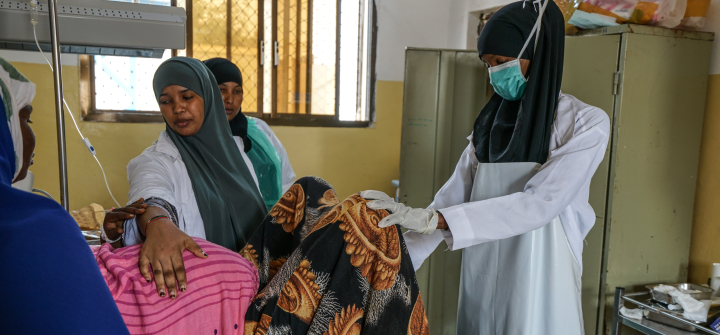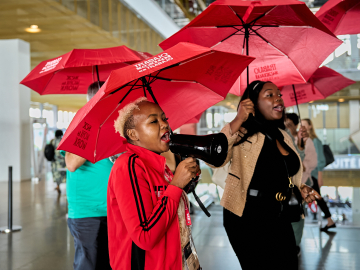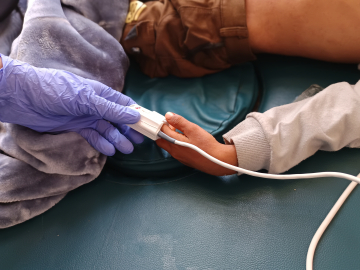Bridging the Gender Gap around Diagnostic Testing to Embrace Health Equity
Throughout the world, gender inequities in health are readily apparent, preventing women from receiving the health care they need, in a timely manner, and delivered in a way that responds to their unique needs and expectations, thus demanding a focus on women-centered solutions.
Access to diagnostic testing is a case in point. Women are likely to need more diagnostic tests than men over the course of their lives, for reasons related to reproductive health, pregnancy, and childbirth. However, the basic tests that women need but men do not are often not easily accessible or available. In some countries, as few as 13% of women receive the full set of antenatal tests recommended in pregnancy.
Inequity in economic status means that women often lack the financial and decision-making power to access testing, when it is available. Women often rely on their husbands or families to pay for tests; in a study of pregnant women in Nigeria, 97% reported being dependent on their husbands for money to access antenatal testing and care. Women may also fear testing procedures and face stigma around diagnosis. In one study, 40% of women in rural India reported fear that their spouses would no longer support them after a diagnosis of tuberculosis.
Can diagnostic testing be transformed to empower women to take ownership of their own bodies and their own care? We believe so, but only with an intentional focus on the specific needs of women and making it a priority to close the gender gap in health.
First, there has been a lack of investment around diagnostics focused on women’s health, and limited research into the barriers that women face in accessing testing. Achieving equity in healthcare and universal health coverage hinges on ensuring that women and girls have better access to diagnostic testing. Women-centric approaches tailored to address the specific issues women face around testing across the care cascade are urgently needed. This includes developing better diagnostic tools for diseases that disproportionately or only affect women, particularly breast, cervical, and ovarian cancers, and making it easier for women everywhere in the world – including low- and middle-income countries (LMICs) – to get tested. For this to be effective, women need to be at the forefront of the design and delivery of diagnostic solutions, to ensure that tests, testing strategies, and linkages to appropriate care are responsive to their needs and expectations, including preference for female health workers.
Second, novel technologies and new approaches to testing can empower women in this context. Self-sampling and self-testing for priority conditions is an overlooked and underdeveloped strategy for gender equity in health. Women often prefer to self-test at home, as a more convenient, discreet, and affordable method. Self-testing is also particularly important for conditions where there may be stigma attached. For example, unmarried women in certain settings may benefit from access to affordable pregnancy self-tests that allow them to test in a private location and avoid any stigma associated with their reproductive health choices.
Self-sampling is a promising approach to screen for human papillomavirus (HPV), the cause of most cervical cancers. Cervical cancer is one of the most deadly forms of cancer for women – causing more than 300,000 deaths a year – yet is both preventable and treatable if detected early. However, understandably, women may be hesitant to undergo the pelvic examination traditionally required to screen for cervical cancer, and many LMICs lack the health workforce for comprehensive HPV screening. Allowing women to take their own vaginal samples for HPV screening has been shown to be safe and accurate, and has the potential to massively broaden access to cervical cancer screening and save lives. Increasing access to HPV screening, for example using self-sampling approaches, is essential to meet the World Health Organization’s goal to eliminate cervical cancer.
Third, women-centric care requires us to reconsider service delivery models that bring care closer to women, recognizing the specific barriers to access that women face and developing approaches that allow women to access care more easily in the community. Part of this is recognizing the essential role that women play in healthcare delivery, particularly community-based care. Women comprise 70% of the global health workforce, including most primary healthcare professionals and 90% of nurses and midwives. However, research and development of community-based diagnostic tools and tests designed for primary health centres around the world has also been inadequate. The Lancet Commission on diagnostics found that the availability of basic primary healthcare tests critical for women – tests for HIV, syphilis, anaemia, diabetes and simple obstetric ultrasounds – is woefully inadequate. Leveraging the female health workforce and equipping them with the simple set of existing tools essential to address women’s health needs to be an urgent global health priority.
Finally, women-led coalitions are also important as trusted sources of information and advocates to champion women’s health, playing an important role in amplifying the voices of those who face the greatest burden of disease and connecting women’s needs in the community with solutions at the health system level. For example, women-led coalitions can identify barriers around HPV screening; raise awareness the importance and availability of testing and treatment options, provide user-led feedback to inform the development and scale-up of new testing tools and solutions and advocate for supportive policy and funding environments to expand access.
Forging a gender-equal world requires us to confront gender inequities in healthcare and work together on women-centric solutions that can overcome barriers to care that are worsening women’s lives. Testing is a foundation of good healthcare and a universal right. Together we can ensure that women and girls have access to the tests and healthcare they need, without hardship, and bring about a healthier and fairer world for all.
Dr Soumya Swaminathan is an internationally recognized global health expert, most recently serving as the first Chief Scientist of the World Health Organization. She is a FIND Board Member.
Dr Angela Muriuki is Director of Women’s Health at FIND.
Dr Bill Rodriguez is Chief Executive Officer at FIND.
Staff care for a pregnant patient in the Trocaire Doolow Hospital in Doolow, Somalia, October 15,2022. Giles Clarke/UNOCHA/Getty




